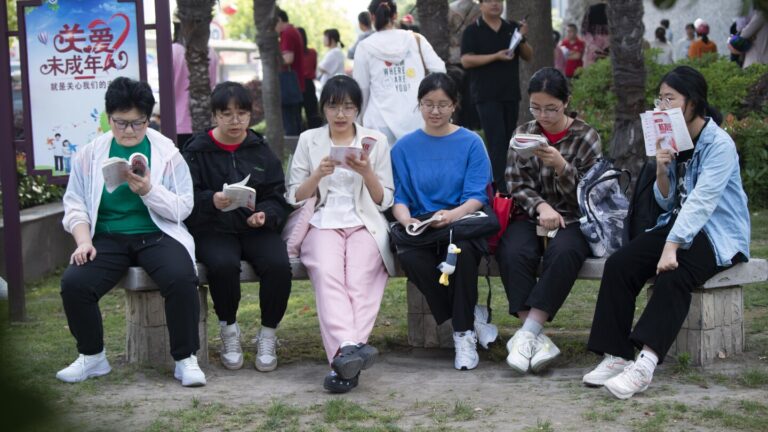A 17-year-old vocational school student from the countryside China He made it to the finals of a math competition, beating many students from top universities, and became a social media celebrity. Education System.
Jiang Ping, a fashion design student, placed 12th in the Alibaba World Mathematics Competition, making her one of 802 people to advance to the finals in the eight-hour test on Saturday.
A video of Jiang’s interview posted on social media by contest organizer Damo Academy has garnered more than 800,000 likes and 90,000 comments, with most expressing amazement while some questioned its authenticity.
Jiang, who could not be reached for comment, said in a video interview that she enjoys working with advanced mathematics because it “brings out my inquisitiveness,” but that she did not believe she was qualified to enter the competition.
Congratulations poured in. Visitors to her parents’ home in a village in Jiangsu province on China’s east coast brought alcohol and money to show their support. Her photo was displayed on the wall of a shopping mall in her hometown of Lianshui. Zhejiang University and Jiangsu University praised her on their Weibo accounts.
It is unclear how Jiang ended up attending the vocational school, but her story has made waves in some parts of China. Rural-urban inequality And how it makes it harder for even talented students to succeed financially.
“Although Jiang Ping has been publicly praised, deep down many Chinese feel that her story highlights the despair of education in China,” said Jiang Xueqin, a China-based education researcher. “For ordinary Chinese who lack the power, wealth and ‘guanxi’ (connections in Chinese), the situation is fundamentally unfavorable.”
The education gap appears to have worsened in recent years: In 2019, rural areas in China spent 17% less on education than urban areas for the nine years of compulsory education (excluding high school). In 2013, it was only 2% lower, according to calculations based on data from a Peking University report on the urban-rural gap in per capita spending.
Seventy percent of students at China’s vocational schools come from rural areas, according to data from the Ministry of Education, a high proportion that suggests the education system functions like a caste system, said Jiang, the researcher.
Jiang, a math genius, is the only college student among the finalists, most of whom are Chinese and from top universities, including Cambridge, MIT, Caltech and China’s top two universities, Tsinghua and Peking. Winners will receive prizes ranging from $2,000 to $30,000.
The contest was launched six years ago by Chinese e-commerce giant Alibaba. Jack Ma, then chairman of Alibaba GroupHe said his goal is to find students who love math and encourage and support them.
Jiang did well enough in the entrance exam to go on to high school, the Communist Party secretary at his college told state CCTV.
The secretary said she applied to a vocational school instead of high school because her sister and a close friend attended there. Other Chinese media reported that it was because she came from a poor family and the vocational school offered her a scholarship.
Attempts to reach Jiang were unsuccessful. Calls to his school went unanswered, and Alibaba-owned Damo Academy did not respond to emails.
In a video interview, Jiang said she wanted to get into a good university, and while vocational school students are limited in the number of universities they can get into, it’s not impossible.

